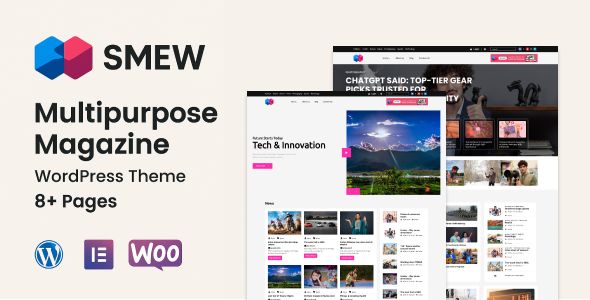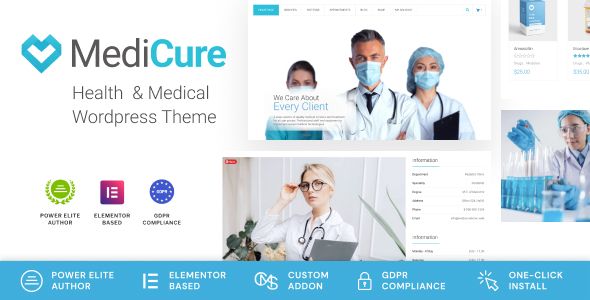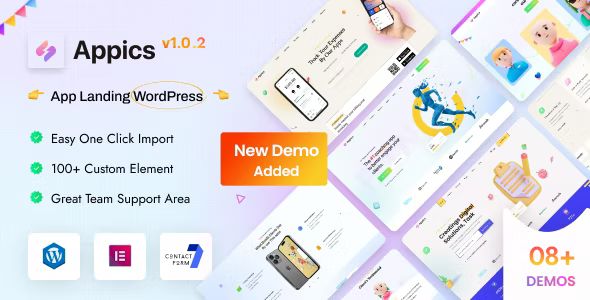Mindthera – Psychology and Counseling WordPress Theme

- Description
- Reviews
- FAQ

You’re not just putting words on a webpage—you’re meeting someone at a vulnerable moment and giving them a safe, clear path to care. This premium distribution of Mindthera – Psychology and Counseling WordPress Theme is built for that responsibility. From the first minute after activation, every feature is available, updates stay in step with official releases, and you’re free to use it across unlimited sites under a simple one-time cost. No per-domain keys, no “Pro-only” walls, no activation detours between drafting a message and helping a person take the next step.
Below is a practitioner-friendly, deeply detailed guide to planning, launching, and growing a mental-health website on Mindthera – Psychology and Counseling WordPress Theme—with special attention to language that reduces anxiety, page structures that keep choices simple, and design decisions that make booking feel safe. Throughout, you’ll see how this distribution’s freedoms (unlimited sites, full features from day one, synchronized updates, ready after install) turn a strong theme into a dependable standard for solo therapists, group practices, and multi-location clinics.
Why this distribution matters (everyday advantages)
-
Unlimited sites — Roll out a primary clinic site, location minisites, specialty landing pages (e.g., couples, perinatal, trauma), a training hub, and seasonal campaigns—without counting licenses.
-
All features included — Every layout, block, and template in Mindthera – Psychology and Counseling WordPress Theme is available immediately. Nothing is locked behind upsells.
-
Synced with official release — Version numbers and changelogs track the upstream project so refinements and compatibility fixes land when they should.
-
One-time cost — Budget once; scale calmly as your practice grows.
-
Ready after install — No activation hurdles. Start composing Home, Services, Clinician bios, and Booking on day one.
These aren’t abstract perks—they’re hours saved and friction avoided, especially when multiple clinicians are publishing.
What Mindthera is (and who it serves)
Mindthera – Psychology and Counseling WordPress Theme is a calm, trustworthy framework for mental-health websites. It’s ideal for:
-
Solo practices needing a warm presence, concise services, and easy appointment requests.
-
Group clinics with multi-location maps, clinician directories, and routing by specialty/availability.
-
Telehealth-first teams requiring time-zone clarity, tech expectations, and private-space tips.
-
Specialized programs (e.g., trauma care, couples intensives, adolescent groups) that require focused landing pages.
-
Training & supervision hubs that publish workshops, CE info, and application forms.
The visual tone is intentionally gentle: supportive accent color, measured spacing, legible type, and micro-interactions that guide without demanding attention.
Design system: clarity, warmth, and dignity
-
Typography — A calm heading scale and readable body size for phone-first visitors; captions handle practical details (session length, insurance notes) without clutter.
-
Color — One accent sets a supportive mood; neutrals keep content accessible (including a dark appearance tuned for evening browsing).
-
Cards — Services, clinicians, conditions, and resources share a coherent grammar: title → brief context → action.
-
Motion — Subtle reveals and sensible transitions; nothing “salesy” or jarring.
-
Iconography — Functional, not decorative: in-person/virtual indicators, session length, accessibility notes.
Everything reduces cognitive load so the next step feels manageable.
Pages you’ll actually ship (and why they work)
Homepage (felt safety in the first screen)
-
Compassionate opener that normalizes help-seeking and names the hope: “Support that meets you where you are.”
-
Who we help tiles (Adults, Teens, Couples, Families) leading to focused pages.
-
Services sampler with quick links to individual, couples, group, assessments, and coaching.
-
Three clinician cards (photo, approach sentence, specialties) and a link to the full directory.
-
Credibility markers (years in practice, modalities, community involvement) placed quietly.
-
Clear primary action: “Request an appointment” or “Book a free 15-minute consult.”
Services (index + detail)
Outcome-led language, session structure, who benefits, modalities in plain words (CBT, EMDR, ACT, EFT), session length, fees, and insurance notes. An FAQ block sits close to the request button so uncertainty doesn’t become exit.
Conditions & concerns
Gentle explanations of anxiety, depression, grief, trauma, burnout, relationship strain—framed as common experiences with practical first steps. A short “What a first session looks like” note lowers the bar to start.
Clinician directory
Filter by specialty, modality, availability, location/telehealth, and languages. Profile pages use a warm, first-person voice to describe approach, then list training and license details. Each profile ends with a clear action button.
Telehealth hub
Tech expectations, privacy tips, backup plan if a connection drops, crisis resources (clearly distinguished from booking), and time-zone clarity. Keep it practical and reassuring.
Fees & access
Transparent rates, superbill guidance, sliding-scale availability, cancellation windows written kindly, accessibility notes (parking, elevator, restrooms, sensory-aware spaces), and language access.
Blog & resources
Short explainers (500–900 words), coping guides, boundary scripts, seasonal topics (“Managing transitions,” “Sleep foundations”), and printable tools. This content builds trust and internal linking depth.
Contact & booking
A short form with routing (“I’m seeking… Adults / Teens / Couples”), preferred times, and a gentle privacy note. If embedding a scheduler, ensure the layout stays calm on phones.
Intake flow that feels human
Mindthera’s structures help you keep forms short and expectations clear:
-
Minimal fields: name, email, reason for contact, preferred times; phone optional.
-
Routing by specialty to match inquiries with fitting clinicians.
-
Response-time promise (“We usually reply within 1 business day”) near the button.
-
Post-submit clarity: confirmation + what happens next + crisis note placed considerately (not alarmist).
People arrive in many emotional states; this flow meets them kindly.
Content style guide (language that helps)
-
Lead with validation, follow with explanation, end with one clear action.
-
Prefer concrete outcomes (“sleep better,” “argue less, connect more”) over jargon.
-
Use short paragraphs and informative subheads; avoid dense walls of text.
-
Place fees and policies near CTAs in friendly, plain language.
-
In bios, start with approach and presence, then list credentials and specialties.
This is not marketing flourish—it’s care.
Accessibility & inclusion (quiet signals of credibility)
-
Readable contrast & visible focus states in both appearances.
-
Keyboard navigation across menus, accordions, tabs, carousels.
-
ARIA where helpful, especially in FAQ accordions and alerts.
-
Inclusive photography & copy that reflect diverse backgrounds, bodies, families, and ages.
-
Language & cultural notes if you provide care in multiple languages or culturally responsive modalities.
A more accessible site converts better and reduces support load.
Performance & Core Web Vitals (speed reads as competence)
Mindthera’s defaults support real-world speed:
-
Ratio-aware images to eliminate layout shift in heroes and headshots.
-
Deferred non-critical scripts so content paints early.
-
Lean font strategy with limited weights and sensible fallbacks.
-
Critical CSS for home, services, and clinician templates.
-
Cache/CDN-friendly assets with predictable versioning.
Right-size images and you’re on track for comfortably green vitals—even with galleries and long pages.
Editor experience (your team spends hours here)
Publishing with Mindthera – Psychology and Counseling WordPress Theme feels like composing a brochure:
-
Block spacing mirrors front-end rhythm, so drafts look close to live.
-
Reusable patterns: service summaries, FAQ accordions, clinician cards, resource callouts, CTA strips.
-
Media-first blocks with focal-point control so headshots and space photos crop kindly.
-
Preview breakpoints to sanity-check phone scannability.
-
Global style tokens for buttons/links/cards—change once, ripple everywhere.
When editing is pleasant, cadence improves—and outreach scales.
Setup blueprint (clean install → first bookings)
-
Install & activate Mindthera – Psychology and Counseling WordPress Theme (ready immediately).
-
Set global styles: calming accent, heading/body pair, button radius, link/hover, focus outlines.
-
Compose homepage: opener + “who we help,” services sampler, three clinician cards, primary CTA.
-
Create services & condition pages: outcomes first, plain-language modality notes, FAQ near the button.
-
Build clinician directory: consistent photos, warm bios, specialties, action button.
-
Add fees & access: rates, insurance notes, sliding scale, cancellation window, accessibility info.
-
Publish telehealth page: expectations, privacy tips, time-zones.
-
Seed resources: two short explainers + one seasonal post.
-
Tune performance: right-sized images, lazy-load non-critical media, preload first heading font if needed.
-
QA on a mid-range phone: Home → Service → Clinician → Booking; fix friction; open appointments.
With copy ready, a small team can do this in an afternoon.
Real-world practice patterns
-
Solo practice — Clear services, a personable About, and a booking form routed to your calendar.
-
Group clinic — Filters by specialty/insurance, multi-location map, and clinician-specific action buttons.
-
Telehealth-only — Time-zone cues, private-space guidance, short intake; optional phone scheduling.
-
Program-based center — Dedicated pages for couples intensives, DBT groups, or trauma intensives; schedule tables and registration forms.
-
Training & supervision — Workshop listings, application forms, faculty bios, and a blog for case reflections.
All reuse the same calm design bones, so your network stays coherent.
Trust signals that reduce hesitation
-
Licensure & training near bios, presented plainly.
-
Approach summaries that describe what sessions feel like and how progress is reviewed.
-
Availability (“Evenings,” “Weekends,” “Currently waitlisting”) stated clearly.
-
Insurance & superbill notes in plain language.
-
Crisis clarity placed considerately (footer note or contact page), unmistakable yet not alarming.
Trust—not pressure—gets people to click “Request an appointment.”
SEO foundations that are truly editorial
-
Semantic headings (Services → Anxiety Counseling → FAQ) that mirror how people search.
-
Readable slugs & breadcrumbs for orientation.
-
Internal linking: resources → services → clinicians; clinicians → specialties → appointment.
-
Location pages with neighborhood and transit/parking details in plain language.
-
Consistent cadence (one short post per week) to compound authority.
Write for people first; structure for systems. Mindthera handles the scaffolding.
Operations: small choices, big wins
-
Use first-person in bios (“I help…”) to lower barriers.
-
Place a one-line fee note near the booking button; long details live on the Fees page.
-
Keep forms short; every field must earn its keep.
-
Set response-time expectations (“We reply within 1 business day”).
-
Photograph intentionally—natural light, uncluttered rooms, diverse representation.
-
Newsletter cadence for current clients (coping skills, seasonal reminders, practice updates).
These details show up as lower drop-off and more aligned inquiries.
Comparing Mindthera to generic “healthcare” themes
Many healthcare themes feel hospital-cold—dense menus, hard edges, and jargon-heavy templates. Mindthera – Psychology and Counseling WordPress Theme is different: it is deliberately warm and editorially disciplined. It protects dignity, quiets overwhelm, and keeps the path to booking clear. Paired with this distribution’s practical freedoms—unlimited site usage, all features included, updates synchronized with official releases, ready after install, and a one-time cost—you get more than a theme. You get a care-first standard your organization can rely on.
Troubleshooting & quick wins
-
High bounce on Services → Add a two-sentence “What a first session is like,” move the request button above the fold, and surface three FAQs nearby.
-
Clinician grid feels uneven → Standardize headshot ratios, keep bios to ~90–120 words, and cap specialty lists.
-
Slow LCP on home → Use a single hero image, compress it well, defer non-critical animations.
-
Confusion around fees → Place a short rate note near the CTA and link to Fees; avoid hiding rates completely.
-
Telehealth skepticism → Add a “Is virtual right for me?” box with three concrete benefits and pacing tips.
-
Accessibility feedback → Increase body line height, ensure focus outlines pop, verify accent contrast.
-
Misdirected inquiries → Clarify exclusions gently on Services and add a brief “We may not be the right fit if…” note.
Small changes here often improve metrics within days.
Maintenance & update rhythm (predictable by design)
Because this edition follows official releases:
-
Compatibility with current WordPress/PHP versions stays current.
-
Spacing and responsive refinements continue to improve reading comfort.
-
Editor parity improves so drafts mirror front-end spacing.
-
Edge-case fixes (accordion focus, sticky header logic, gallery keys) land on schedule.
-
Clear changelogs keep staging and rollout calm.
Plan updates as routine—not as emergencies.
FAQ
Q1: What’s different about this premium distribution of Mindthera?
You get the complete Mindthera – Psychology and Counseling WordPress Theme with every feature available immediately. Practically, that means unlimited site usage under a one-time cost, updates synchronized with official releases, and a friction-free start with no per-domain activation keys.
Q2: Are updates aligned with the official project?
Yes. Version numbers and changelogs track the upstream cadence so refinements and compatibility improvements arrive on schedule.
Q3: Can I deploy Mindthera across multiple locations or clinician minisites?
Absolutely. Unlimited site usage is a core advantage—perfect for multi-location practices and clinician-specific pages.
Q4: Are all features unlocked from day one?
Yes. Layouts, blocks, demo compositions, and configuration panels are ready right after install—no “upgrade to unlock” prompts mid-build.
Q5: Will Mindthera help with Core Web Vitals?
It favors ratio-aware images, deferred non-critical scripts, limited font weights, and critical CSS for key folds. Combine these with sensible image sizes and caching for reliably green vitals.
Q6: Will it fit my editing workflow?
Yes. The native editor experience is smooth; global style tokens keep typography and spacing coherent even when you add specialized landing pages.
Q7: How should I structure content for clarity?
Keep Services outcome-led, Conditions de-stigmatizing, Bios warm and specific, and FAQs close to CTAs. Use internal links to guide the journey.
Q8: Can I handle telehealth and multi-language needs?
Yes. Spacing and typography hold up across scripts; date/number formatting respects locale; time-zone clarity can be surfaced in telehealth notes.
Q9: How do I present fees without scaring people away?
Use a short, friendly line near CTAs (“$X per session; sliding scale available”) and a detailed Fees page for context. Clarity reduces drop-off.
Q10: Do I need extra plugins to look professional?
No. Defaults are deliberately elevated. Add plugins only for specific needs (complex forms, analytics), not to patch weak presentation.
Q11: What about accessibility?
The theme prioritizes contrast, focus states, keyboard navigation, and ARIA where helpful. Keep alt text and plain-language labels for best results.
Q12: Can I migrate from a legacy site smoothly?
Yes. Map pages to Mindthera’s templates, standardize image ratios, regenerate thumbnails, and stage the cut-over. The card/spacing system is forgiving.
Q13: Will the dark appearance harm readability?
No. It’s tuned for contrast and comfortable line height. Keep accent colors saturated enough for button visibility.
Q14: How do I route inquiries to the right clinician?
Use a short intake form with a “Reason for contact” selector and tag clinicians by specialty and availability; route accordingly.
Q15: Why choose Mindthera over generic healthcare themes?
Because Mindthera – Psychology and Counseling WordPress Theme is purpose-built for mental health: warm tone, de-stigmatizing templates, and a booking path that feels safe—paired with unlimited site usage, full features, synced updates, ready-after-install simplicity, and a one-time cost.
Closing notes
Mindthera – Psychology and Counseling WordPress Theme earns trust by staying calm, clear, and human. It turns difficult decisions into manageable steps and makes publishing feel like progress, not overhead. Pair that with the practical freedoms of this distribution—unlimited site usage, all features included, updates aligned with official releases, ready after install, and a one-time cost—and you get more than a theme. You get a reliable, care-first standard for solo practices, multi-clinician groups, and growing clinics alike.
Q: Do I need a license key?
A: No. All products are Pre-Activated. You can use 100% of the Premium features immediately.
Q: Can I use the One-Click Demo Import?
A: Yes, absolutely! We ensure the demo import feature works perfectly.
Q: Can I use the products on multiple websites?
A: Absolutely. The GPL license allows use on unlimited domains.
Q: Are the files safe?
A: Yes. All files are scanned by McAfee and VirusTotal before uploading.
Share Now!















